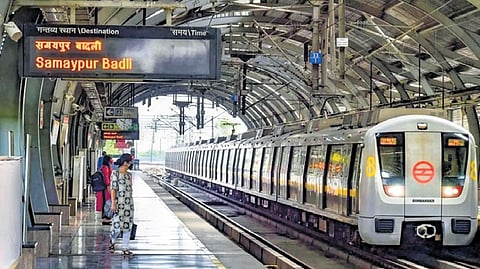No medical units, fewer AED devices in metro stations for passengers, reveals RTI
NEW DELHI: Despite operating an expansive 393-kilometre metro network with 288 stations, the Delhi Metro Rail Corporation (DMRC) lacks dedicated medical units to handle passenger emergencies. Moreover, only six stations on the Airport Express Line—the least frequented route—are equipped with Automated External Defibrillators (AEDs), vital for reviving cardiac arrest victims.
The information was revealed in an RTI query filed by Dr Aman Kaushik, accessed by this newspaper. The RTI sought a list of metro stations where medical teams, doctors, and AED devices are available. The DMRC’s response was stark: no medical units or doctors are deployed at any station, and AEDs are present only at six stations on the Airport Line—New Delhi, Shivaji Stadium, Dhaula Kuan, Delhi Aerocity, Airport (T-3), and Dwarka Sector-21.
Dr Kaushik recounted the incident that pushed him to file the RTI. “Last year, I witnessed a passenger collapse inside the metro. There was no trained staff to administer CPR, and the crowd panicked. I stepped in and performed CPR, reviving the patient. The individual was dropped off at Azadpur Metro Station, but there was no AED machine there,” he said.
Kaushik highlighted the absence of AEDs at busy interchange stations like Rajiv Chowk and Kashmere Gate, Kaushik emphasised the urgent need for trained personnel and adequate equipment to handle cardiac emergencies.
“Sudden cardiac deaths can be reduced only with proper CPR training and the availability of AEDs at all stations,” he said. A DMRC official responded to the RTI stating that operations personnel and station staff have been trained in first aid and CPR. “First aid kits are available with train operators and at all stations. In case of emergencies, station staff provide assistance, including wheelchairs, stretchers, and first aid.
Passengers are escorted to the nearest hospital via ambulances, PCRs, or private vehicles to ensure timely medical care during the golden hour. Each station’s control room has details of nearby hospitals, and injured passengers can also be shifted to empanelled hospitals if needed,” the official said.
Dr Kaushik, however, argued that while tie-ups with CAT ambulances and hospitals are helpful, they are not sufficient to address sudden cardiac arrests.

